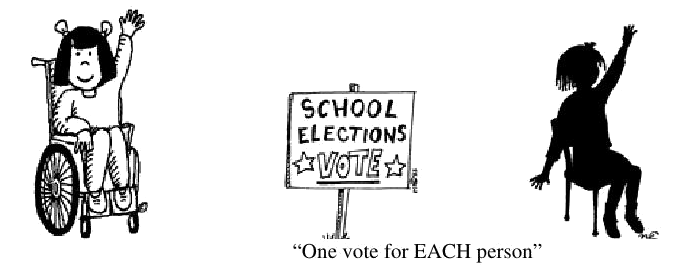Read the Previous Principle, Read the Next Principle, or Return to table of contents
Principle 6: All adults get one vote

In a democracy people who are old enough and experienced enough to understand the issues that are being voted upon get to vote. We say adults are old enough and experienced enough to get to vote. Do you think ALL adults should get to vote? What if they disagree with the army? Or, what if they are poor? What if they are in a wheelchair? In a democracy, whether or not an adult is sick, rich, poor, disagrees with the army, is male or female, that adult gets to cast his one vote. In the drawing there is a school election. It is a democratic election. The girl in the wheelchair gets to vote. The girl all in black gets to vote. Each person gets one vote. No matter what race or religion they are, they get to vote. Remember, in a democracy we say that every voter is as important as every other voter, so no voter is more special than another voter. The sun shines equally on all. They all get to vote, even if they are different than other people.
Story:
“I even voted for you twice,” teased Nat, “so you know I wanted you to stay.” But Petra and Nadesh knew that wasn’t really possible. It was clear that each person got just one vote, it did not matter who they were. It didn’t make any difference if you did important chores or simple ones, or how long you had been here. Being more experienced or more popular didn’t seem to make any difference here when it came to voting. If you were rich, you got one vote. If you were poor, you got one vote. If you were male, you got one vote. If you were female, you got one vote. One person, one vote - that was how it was. To be continued....
Activity: To prepare, use play money or cut up slips of paper and mark $5 on some and $100 on others. Hand out the “money” making sure that some have a lot of money and some only have a little. Ask the children to suggest two or three activities they would like to do and write the activities on the board. Have the children who have more than 200 dollars stand up. Announce that these rich people will decide the activity. The others will complain. Encourage discussion. To further make the point, write the names of 2 or 3 of the area’s major religions on slips of paper—one religion per slip of paper. Put the religions in a box, sack, or hat and have each student draw one. Explain it is just a game and only for a few minutes to make a point. It is playing pretend. Take each religion in turn, saying, “Now we will let the Catholics make all the decisions.” Students who have drawn other religions will object. “OK, will all the Protestants please stand up? You now get to be the decision makers.” Again you will hear objections. Encourage discussion until it is clear to most students that having more or less money or being this or that religion has nothing to do with who gets to vote. You might conclude with, “In a democracy, all adults get to vote!”
Read the Previous Principle, Read the Next Principle, or Return to table of contents